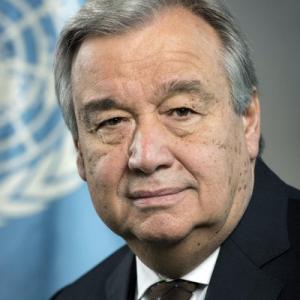A. Guterres: Shocked? Obviously yes, I mean, it's dramatic to see so many people dying and it's dramatic to see this devastating impact on economies and societies, especially on the most vulnerable people. But not surprised, because unfortunately what is true, is that the world was not able to come together and to face COVID-19 in an articulated coordinated way.
Each country went with its own policy, different countries with different perspectives different strategies, and this has allowed the virus to spread coming from one place to another, then to another now moving South, eventually coming back. And we would need, and I made that proposal to G20, the need to have a mechanism of coordination of the international response in which all countries would have complementary strategies and act both in cracking down on the COVID-19 and in the strategies to exit and to reopen and then to recover.
BBC: Who do you blame for that? Are you talking about the great power rivalry between the United States and China? This propaganda war that erupted since COVID-19 became a pandemic?
A. Guterres: I think it's obvious, that we lack leadership that can only be possible if the key countries in the world the key powers in the world are able to come together and to have a common strategy and then to bring with them the whole of the international community. This is a tragedy, but it could also be an opportunity. An opportunity namely in relation to climate change and opportunity in relation to inequalities that prevail in the world, to the gaps that exist in our social protection systems, an opportunity to rebuild differently. But again, this would require a much more effective international cooperation.
BBC: Do you think the WHO sounded the alarm early enough? There have been complaints from member states that they didn't get warnings in January or February.
A. Guterres: I think that there was at least enough for many to do what unfortunately was not done. But of course, as I said, we will need to look seriously into what has happened, and we look to draw lessons from what has happened. And in my opinion, this is not the moment to do it this is the moment to concentrate efforts to fight COVID-19.
BBC: Do you think the Trump administration was wrong to suspend funding of the WHO?
A. Guterres: I believe that it’s essential to keep as maximum as possible resources within WHO. Because in the present situation for the reasons I invoked it's impossible to replace it in providing support especially to the developing countries. And today my main concern is in the developing world, I mean we are as strong as the weakest of our systems, and so to vitally support the developing world at the present moment is not a matter of generosity, is a matter of enlightened self-interest. The global North cannot defeat the COVID-19 without the global South defeating it at the same time.
BBC: What you're saying, is that the world should regard this as a wake-up call for another global emergency which is climate change, and the new normal the normal that emerges after this pandemic has to be different, specifically when it comes to climate change?
A. Guterres: I think we have an opportunity now to do things differently. It is clear that the world is too fragile in relation to the global challenges, that we face. That fragility was demonstrated obviously with the pandemic because it was an immediate impact. Many are still doubting about the impacts of climate change, because they will be extended for a larger period. But we know that is already here and we know that it is already devastating and I think we have the obligation now to organize recovery in a way that is much more friendly to the green economy and the green society.
Full video: https://www.bbc.com/news/av/world-us-canada-52496983/coronavirus-lack-of-co-ordination-let-virus-spread-un-s-guterres



